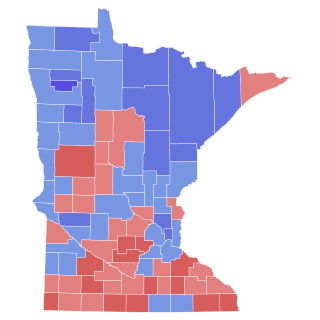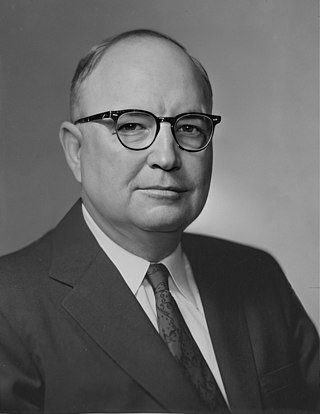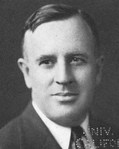
Prentiss Marsh Brown was a Democratic U.S. Representative and Senator from the state of Michigan.

The 1982 United States Senate elections were held on November 2, 1982. They were elections for the United States Senate following Republican gains in 1980. The 33 Senate seats of Class 1 were up for election in 1982. A total of four seats changed hands between parties, with Democrats winning seats in New Jersey and New Mexico, and Republicans taking seats in Nevada and the seat of the lone independent, Senator Harry Byrd Jr., in Virginia. Democrats made a net gain of one seat in the elections, while Republicans stayed at 54 seats for a majority. However, the Democratic gain in New Jersey replaced a Republican that had been appointed earlier in the year.

The 1972 United States Senate elections were held on November 7, with the 33 seats of Class 2 contested in regular elections. They coincided with the landslide re-election of Republican President Richard Nixon. Despite Nixon's landslide victory, Democrats increased their majority by two seats. The Democrats picked up open seats in Kentucky and South Dakota, and defeated four incumbent senators: Gordon Allott of Colorado, J. Caleb Boggs of Delaware, Jack Miller of Iowa, and Margaret Chase Smith of Maine. The Republicans picked up open seats in New Mexico, North Carolina, and Oklahoma, and defeated one incumbent, William B. Spong Jr. of Virginia.

The 1970 United States Senate elections was an election for the United States Senate. It took place on November 3, with the 33 seats of Class 1 contested in regular elections. Special elections were also held to fill vacancies. These races occurred in the middle of Richard Nixon's first term as president. The Democrats lost a net of three seats, while the Republicans and the Conservative Party of New York picked up one net seat each, and former Democrat Harry F. Byrd Jr. was re-elected as an independent.

The 1960 United States Senate elections coincided with the election of John F. Kennedy as president on November 8, 1960. The 33 seats of Class 2 were contested in regular elections. A special election was also held on June 28, 1960, for a mid-term vacancy in North Dakota. The Republicans gained two seats at the expense of the Democrats. However, Republican Senator-elect Edwin Keith Thomson of Wyoming died December 9, 1960, and was replaced by appointee Democratic John J. Hickey at the beginning of the Congress, reducing Republican gains to one seat.

The 1954 United States Senate elections was a midterm election in the first term of Dwight D. Eisenhower's presidency. The 32 Senate seats of Class 2 were contested in regular elections, and six special elections were held to fill vacancies. Eisenhower's Republican party lost a net of two seats to the Democratic opposition. This small change was just enough to give Democrats control of the chamber with the support of an Independent who caucused with them.

Wilber Marion Brucker was an American Republican politician. Born in Saginaw, Michigan, he served as the 32nd governor of Michigan from 1931 to 1933 and as the United States Secretary of the Army between July 21, 1955 and January 19, 1961.

The 1936 United States Senate election in Massachusetts was held on November 3. Incumbent Democratic Senator Marcus A. Coolidge declined to stand for re-election. Republican Henry Cabot Lodge Jr. won the race to succeed him over Democratic Boston mayor James Michael Curley and former Suffolk County prosecutor Thomas C. O'Brien.

The 1936 United States Senate election in New Hampshire took place on November 3, 1936. Incumbent Republican Senator Henry W. Keyes did not run for re-election.

The 1920 United States Senate elections in Arizona took place on November 2, 1920. Incumbent Democratic U.S. Senator Marcus A. Smith ran for reelection to a third term, but was defeated by former Delegate to the U.S. House of Representatives from the Arizona Territory Ralph H. Cameron in the general election. Cameron would become the first Republican elected to the office of U.S. Senator from Arizona since the state joined the union in 1912. The same year, Republican Governor Thomas Edward Campbell was reelected to a second term.

The 1942 United States Senate election in Michigan was held on November 2, 1942. Incumbent Democratic U.S. Senator Prentiss M. Brown ran for re-election to second term in office, but was defeated by Republican Homer S. Ferguson.

The 1942 United States Senate election in New Hampshire took place on November 3, 1942. Incumbent Republican Senator Styles Bridges won re-election to a second term in office, defeating Democratic former Governor Francis P. Murphy.

The 1958 United States Senate election in Minnesota took place on November 4, 1958. Democratic U.S. Representative Eugene McCarthy defeated incumbent Republican U.S. Senator Edward John Thye, who sought a third term. With his victory, McCarthy became the first Democrat ever to be popularly elected to Minnesota's Class 1 Senate seat.

The 1944 United States Senate election in Iowa took place on November 7, 1944. Incumbent Democratic Senator Guy M. Gillette ran for a second full term in office but was defeated by Republican Governor Bourke B. Hickenlooper.

The 1922 United States Senate election in Indiana took place on November 7, 1922. Incumbent Republican U.S. Senator Harry Stewart New ran for re-election to a second term in office, but was defeated in the Republican primary by former Republican Senator Albert J. Beveridge. In the general election, Beveridge was defeated by Democratic former Governor of Indiana Samuel M. Ralston.

The 1936 United States Senate election in Iowa took place on November 3, 1936. Incumbent Republican Senator Lester J. Dickinson ran for re-election to a second term but was defeated by Democratic Governor Clyde Herring.

The 1940 United States Senate election in Michigan was held on November 5, 1940.

The 1962 United States Senate special election in New Hampshire took place on November 6, 1962, to elect a U.S. Senator to complete the unexpired term of Senator Styles Bridges, who died on November 26, 1961. New Hampshire Attorney General Maurice J. Murphy Jr. was appointed on December 7, 1961 by Governor Wesley Powell to fill the vacancy until a special election could be held.

The 1972 United States Senate election in Mississippi was held on November 7, 1972. Incumbent Democratic U.S. Senator James Eastland won re-election to his sixth term. As of 2023, this was the last time that the Democrats won the Class 2 Senate seat in Mississippi.

The 1932 Michigan gubernatorial election was held on November 8, 1932. Democratic nominee William Comstock defeated incumbent Republican Wilber M. Brucker with 54.92% of the vote.



















